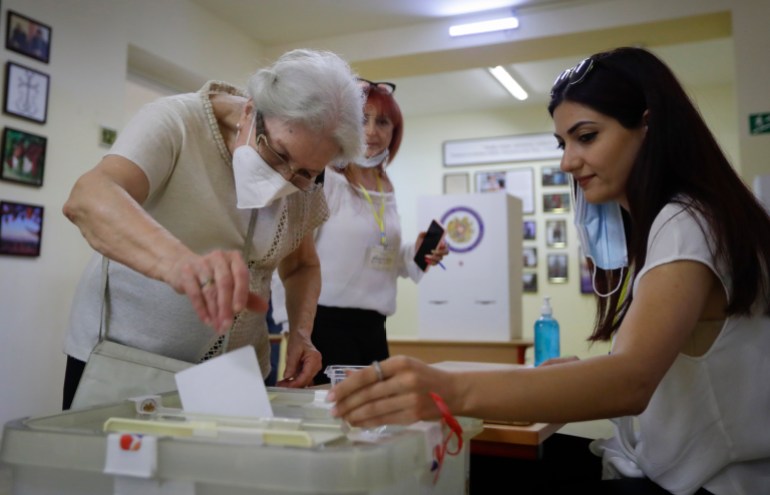
Nikol Pashinyan’s Civil Contract party had 55.61 percent of the vote with two-thirds of ballots counted, preliminary results show.
Nikol Pashinyan, the acting prime minister of Armenia, has claimed victory in a snap parliamentary election he had called in an effort to defuse a political crisis following a disastrous war with Azerbaijan.

With 75 percent of results declared, Pashinyan’s Civil Contract party had 55.61 percent of the vote on Monday. The electoral alliance of his top rival, former President Robert Kocharyan, had 20 percent of the vote, according to the Central Election Commission (CEC).
Voter turnout was about 50 percent, with some 2.6 million people eligible to vote. “The people of Armenia have given our Civil Contract party a mandate to lead the country and personally me to lead the country as prime minister,” Pashinyan said early on Monday.
“We already know that we won a convincing victory in the elections and we will have a convincing majority in parliament,” he added.
Kocharyan’s bloc, however, questioned the credibility of the preliminary results and said it would not recognise Pashinyan’s quick claim to victory, which came when just 30 percent of precincts had been counted.
“Hundreds of signals from polling stations testifying to organised and planned falsifications serve as a serious reason for lack of trust,” the bloc said in a statement, adding it would not “recognise” the results until the “violations” were studied.
 Armenia’s former President Robert Kocharyan visits a polling station to cast his vote during the snap parliamentary election in Yerevan, Armenia June 20, 2021
Armenia’s former President Robert Kocharyan visits a polling station to cast his vote during the snap parliamentary election in Yerevan, Armenia June 20, 2021
Earlier on Sunday evening, the general prosecutor’s office said it had received 319 reports of violations. It said it had opened six criminal probes, all of which concerned bribes during campaigning.
The election is being monitored by experts from the Organization for Security and Co-operation in Europe (OSCE), which recently assessed the voting as largely fair and free. They will deliver an overall verdict on Monday.
Opinion polls prior to the election had put the two parties neck and neck. And while a record four electoral blocs and 21 parties ran for election, only a handful are expected to win seats in parliament.
Pashinyan had called the snap poll to try to end a political crisis that erupted after ethnic Armenian forces lost a six-week war against Azerbaijan last year and ceded territory in and around the Nagorno-Karabakh region. More than 6,500 people were killed in the war, according to the latest official figures from Armenia and Azerbaijan.
Pashinyan has since been under pressure, with regular street protests demanding he step down over the terms of the peace agreement that ended the conflict. Under the deal, which was brokered by Russia, Azerbaijan regained control of territory it had lost during a war in the early 1990s. Pashinyan himself described the agreement as a disaster, but said he had been compelled to sign it in order to prevent greater human and territorial losses.
From Moscow’s perspective, Pashinyan is a guarantor that the agreement will remain in place. This includes the stationing of some 2,000 Russian peacekeepers in Nagorno-Karabakh. Arsen Kharatyan, a former adviser to Pashinyan, told Al Jazeera the results gave the acting prime minister a chance to form a government “so that the internal political turmoil stops”.
“Now, how are you going to handle the situation that Armenia is in? In the larger picture, the security architecture of the region has not changed much since the war. Russia is still going to be a major player in all of this. So, whoever comes in to power is going to have to deal with Moscow quite directly,” Kharatyan said, adding that Sunday’s vote also showed none of the parties who campaigned on a “pro-Western agenda got enough votes”.
Armenia, which hosts a Russian military base, is a close ally of Moscow, although Pashinyan, who came to power on the back of street protests and on an anti-corruption agenda in 2018, has had cooler relations with the Kremlin.
Turkey, which supported Azerbaijan in last year’s conflict, will also be watching the election closely. On the streets of Yerevan on Sunday, Armenians voiced conflicting opinions about Pashinyan.
Voter Anahit Sargsyan said the prime minister, who spearheaded peaceful protests against corrupt elites in 2018, deserved another chance. She said she feared the return of the old guard whom she accused of plundering the country.
“I voted against a return to the old ways,” said the 63-year-old former teacher.
 An Armenian woman casts her ballot paper at a polling station during a snap parliamentary election – called after last year’s defeat in fighting over Nagorno-Karabakh – in Yerevan, Armenia, Sunday, June 20, 2021
An Armenian woman casts her ballot paper at a polling station during a snap parliamentary election – called after last year’s defeat in fighting over Nagorno-Karabakh – in Yerevan, Armenia, Sunday, June 20, 2021
Another voter, Vardan Hovhannisyan, said he had cast his ballot for Kocharyan, who calls Russian leader Vladimir Putin his friend.
“I voted for secure borders, solidarity in society, the return of our war prisoners, the wellbeing of the wounded and a strong army,” said the 41-year-old musician.
Kocharyan, who hails from Karabakh, has accused Armenia’s leadership of inaction during last year’s war and pledged to start negotiations on Nagorno-Karabakh’s borders if he came to power. Kocharyan was president of Armenia from 1998 to 2008 and was accused of acting unlawfully when he introduced a state of emergency in March 2008 after a disputed election.
At least 10 people were killed in the clashes that followed between police and protesters.
